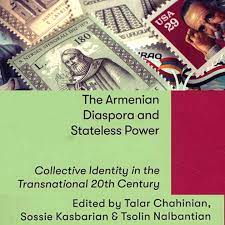LONDON/NY – I. B. Tauris, an imprint of Bloomsbury Publishing, has announced the publication of an edited volume by Talar Chahinian, Sossie Kasbarian, and Tsolin Nalbantian titled The Armenian Diaspora and Stateless Power Collective Identity in the Transnational 20th Century. The book is part of the series Armenians in the Modern and Early Modern World edited by Bedross Der Matossian. The book is dedicated to Khachig Tölölyan, the founder of Armenian Diaspora Studies.
From genocide, forced displacement, and emigration, to the gradual establishment of sedentary and rooted global communities, how has the Armenian diaspora formed and maintained a sense of collective identity? Building on discussions of Tölölyan’s work and its impact on various conceptualizations of the Armenian Diaspora, in all its heterogeneity, this volume brings together historians, cultural theorists, literary critics, sociologists, political scientists and anthropologists to explore how Armenian Diaspora elites and their institutions emerged in the post-genocide period and used ‘stateless power’ to practice forms of social discipline on collective identity and of belonging and loyalty among Armenians. Focusing on cultural, religious, political and literary production, as well as community groups and leaders in such far-flung cities of the Armenian Diaspora as Amsterdam, Addis Ababa, Aleppo, Beirut, Detroit, Istanbul, Jerusalem, Los Angeles and Paris, this collection offers original insight and novel perspectives on the history and experience of the Armenian Diaspora through the long 20th century, from the role of the fin-de-siècle émigré Armenian press to the experience of Syrian-Armenian refugees in the 21st century. More broadly, this book shows how diasporic history and transnational practice can help re-conceptualize and illuminate non-state forms of power and governmentality, that a diaspora’s statelessness can not only be evidence of its power, but that it can also act as an alternative and complement to the nation-state.
The volume is divided into three sections, each featuring a set of chapters that engage with one of Khachig Tölölyan’s key theoretical contributions to Diaspora Studies.
The first section “The Logic of the Sedentary”: Complicating Notions of Home and Homelands includes chapters by Boris Adjemian, “In Search of the Sedentary: Rethinking Homelands in the Armenian Diaspora,”; Gegham Mughnetsyan, “Armenian Displaced Persons: From Displacement to a Diaspora Community,”; and Nare Galstyan, “Diaspora-Homeland elations Re-examined: The case of Syrian Armenian in the Netherlands.”
The second section “Diasporic Social Formation”: Leadership Elites, Institutions, and Transnational Governmentality includes chapters by Hasmik Khalapyan, “Forging Diasporic Identity in the Fin de Siècle Armenian Periodical Press in Europe,”; Vahe Sahakyan, “Transnational Politics and Governmental Strategies in the Formative Years of the Post-Genocide Armenian Diaspora (1920s-1930s),” Lilit Keshishyan, “Defiant Adherence: Cultural Critiques in Late Twentieth Century Armenian Diaspora Literature,”; and Christopher Sheklian, “The Liturgical Subject of the Armenian Apostolic Church: Recent Waves of Migration.”
The third section “The Social Text of Diaspora”: Diasporic Becoming and Legibility in Diaspora’s Semantic Domain includes articles by Sylvia Alajaji, “Sounding Armenian: The Contours of the Diasporic Musical Imaginary,”; Karen Jallatyan “Toward the Diaspora”: The Performative Powers of Vahé Oshagan’s Poetry,”; Talin Suciyan, “The Armenians in Turkey: From Autochthonous People to Diaspora,”; and Hrag Papazian, “Are Istanbul Armenians Diasporic? Unpacking the Famous Debate.”










